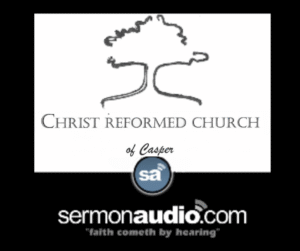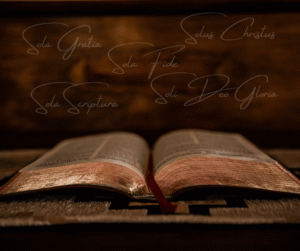LORD’S DAY 34
- How are these commandments divided?
Into two tables:1 the first of which teaches, in four commandments, what duties we owe to God; the second, in six, what duties we owe to our neighbor.2
[1] Ex. 34:28; Deut. 4:13. [ 2] Matt. 22:37–40. [1] Ex. 34:28; Deut. 4:13. [ 2] Matt. 22:37–40
- What does God require in the first commandment?
That, on peril of my soul’s salvation, I avoid and flee all idolatry,1 sorcery, enchantments,2 invocation of saints or of other creatures;3 and that I rightly acknowledge the only true God,4 trust in Him alone,5 with all humility6 and patience7 expect all good from Him only,8 and love,9 fear,10 and honor11 Him with my whole heart; so as rather to renounce all creatures than to do the least thing against His will.12
[1] 1 Cor. 10:7, 14. [2] Lev. 19:31; Deut. 18:10–12. [3] Matt. 4:10; Rev. 19:10; 22:8–9.[4] Jn. 17:3. [5] Jer. 17:5. [6] 1 Pet. 5:5–6. [7] Heb. 10:36; Col. 1:10b–11; Rom. 5:3–4;1 Cor. 10:10. [8] Ps. 104:27–30; Isa. 45:6b–7; Jas. 1:17. [9] Deut. 6:5. [10] Deut. 6:2; Ps. 111:10; Prov. 9:10; Matt. 10:28. [11] Deut. 10:20. [12] Matt. 5:29–30; 10:37; Acts 5:29.
- What is idolatry?
Idolatry is to conceive or have something else in which to place our trust instead of, or besides, the one true God who has revealed Himself in His Word.1
[1] Eph. 5:5; Phil. 3:19; Eph. 2:12; Jn. 2:23; 2 Jn. 1:9; Jn. 5:23; *Ps. 81:8–9; *Matt. 6:24; Ps. 62:5–7 *Ps. 73:25–26.
Looking to God for All our Welfare
Lord’s Day 34, telling us about our obligation to pursue good works, defines good works as those which comply with the Law of God, and the Law was defined as the Ten Commandments. This is not the place for a detailed discussion of whether the Ten Commandments continues as relevant for the New Testament believer, despite being given in the Old Testament. In brief, the curse of the Law no longer holds, for Christ has completely satisfied the demands of the Law. Yet the requirements of the Law were not arbitrary, but reflected God’s creational design for man and humanity’s relationship to God, to creation and to one another. Therefore, even though we know that the Law has been completely satisfied by Christ’s perfect obedience, yet in our saved state, the Law still has a very important role to play in teaching us what a redeemed saint looks like. It shows us the goal of our salvation. It teaches us what it means to be Christlike, like the One who perfectly kept that Law. Question 93 recounts the Ten Commandments, and questions 94-115 will examine the Ten Commandments and teach us what they mean.
The First Commandment is the basis of them all. All violations of God’s Law are a violation of this first commandment, for all sin springs from the same root, the root of pride. If I trusted God completely and put all my hope in Him, I would never look to anything else for any blessing in my life, separate from God. When the commandment tells us not to have any other gods before God, that does not mean “before God” as in “higher in priority than God”, but rather “before God” in the sense of “in His face, where He can see them,” meaning, anywhere. It means we are to put our trust entirely and only in God, and not in anything else. If I trust God 99% of the time for my welfare and prosperity, and anything else 1% of the time, then I am an idolater. So we are all idolaters, for we all fail to trust God for everything we need. If we trusted God completely, we would never sin.
This is not to say I wouldn’t have any need for food or human companionship or sunlight, or any of the many other things that we as human beings need. But God is good and always gives us what we need. Idolatry is the attempt to take control of my welfare for myself. In Romans 1:17-25, Paul says that people “did not glorify [God] as God, nor were thankful… but worshiped and served the creature rather than the Creator.” Glorifying God and being thankful is contrasted to idolatry, the worship of the created thing instead of the One who created the thing.
Worship need not look like bowing down, offering incense or some other specifically “religious” looking activity. It is not the activity of the body but the posture of the heart which is of concern here. Ephesians 5:5 says that a covetous man is an idolater. Jesus says in Matthew 6:24 that we cannot serve two masters, God and mammon, but must ultimately choose (mammon being the material things of this world generally).
To illustrate, if I trust God and expect all good things from Him, then when I have plenty of money I will be thankful and use it the way He has taught me to. I will enjoy the blessings He gave me, giving Him the glory always, and I will not seek a life of luxury, but will share with the poor and support the church. But if I believe that money itself is the source of happiness, then that is to deny that the money comes from God, and then I will seek to accumulate more and more money and I will use it entirely for my own benefit regardless of what God says about it. I will neglect other duties, such as to family, to the poor, and to the church, and spend all my time in the accumulation and enjoyment of wealth. Idolatry is not about whether I think money is good or not. It’s about where I think the money comes from, and consequently, who governs how I get it and how I use it- God or me.
This exercise can be repeated with any good thing that we desire or need. When we trust God as the only source of our good, then we will trust that He is giving us what we need and what is best for us in the moment, and not be covetous for what we don’t have. And therefore, we will not try to seize things we haven’t been given or try to make things more than they really are. Thus the root of all sin is the prideful belief that I can advance my own welfare by using the things of God’s creation or the people in my life the way I think they should be used rather than the way God tells us through His law to use them. It is worshiping and serving the creature rather than the Creator, and the cure for it is trust and thankfulness to God for all things.
The government cannot keep us safe or provide prosperity. Food will not keep me alive. Pleasure will not satisfy me. Friends and family will not fulfill me. God does all of these things for me. God may use these things as secondary means to accomplish His purpose, but as long as I remember that it is God using those things, rather than the things themselves, then I will keep all things in perspective, and keep God as God, as the only source of all good things in my life.
Whenever we look at the Law of God and wrestle with our inevitable failure, let us remember that we have a Savior who kept this law perfectly, and has already paid the debt for our failure to do so. We need not fall into despair, therefore, at how far short of the mark we fall, but rather thank God for our redemption in Christ, and labor, in that peace and confidence, to draw closer to the mark that the Law of God sets out for us.
All are welcome at Christ Reformed Church! We worship at 10 AM Sunday morning at 600 W. 21st St, in College Heights Baptist’s old sanctuary.


Comments are closed, but trackbacks and pingbacks are open.